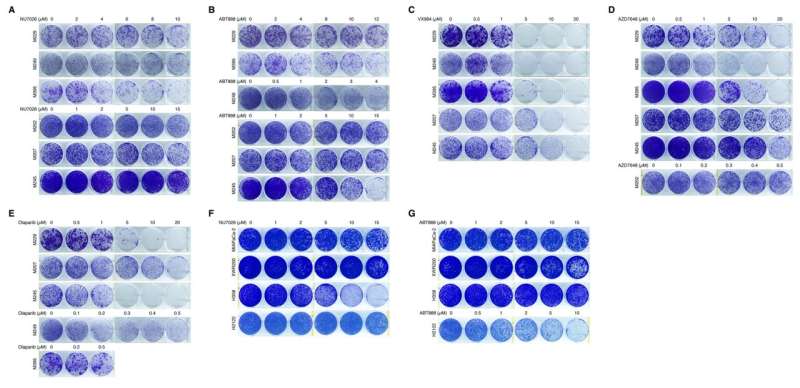This article has been reviewed according to Science X's editorial process and policies. Editors have highlighted the following attributes while ensuring the content's credibility:
fact-checked
peer-reviewed publication
trusted source
proofread
Researchers identify possible approach to prevent cancer from evolving to resist treatment

A new clinical and preclinical study from UCLA Jonsson Comprehensive Cancer Center identifies the DNA roots of resistance to targeted cancer therapy, providing a possible strategy to address a vexing issue in cancer therapeutics. Results are published online ahead of print in Cancer Discovery.
"We are taking a fresh approach to combat 'acquired therapy resistance'—the ability of cancers to escape targeted treatments by undergoing molecular evolution. Intensive research has focused on treatment of cancers that have relapsed, seeking to intervene after the tumor cells have become more complicated and stronger. We thought that preventing, rather than trying to reverse resistance after the cancer has become more aggressive, may improve our patients' odds of survival," said co-senior author Dr. Roger Lo, a UCLA Jonsson Comprehensive Cancer Center researcher and a professor of medicine and molecular and medical pharmacology at the David Geffen School of Medicine at UCLA.
To understand how the cancer genome changes immediately after the initiation of targeted therapy—potentially generating new genetic variants capable of escaping the therapy—the researchers focused on metastatic cutaneous melanoma. This aggressive skin cancer had no effective treatment until the recent development of a targeted therapy for patients whose cancers harbor a BRAF gene mutation—found in about half of metastatic melanoma patients and in patients with many other types of common and highly lethal cancers.
"We hope that by blocking the means for melanoma to generate genetic diversity, we may prevent the myriad of ways the cancer escapes targeted therapy," Lo said.
Through analysis of tumor biopsies taken from patients before targeted therapy and then at the time of clinical relapse, the team found that the melanoma genome can undergo extensive 'shattering and re-stitching' in response to targeted therapy—in a process called chromothripsis.
Small amounts of chromosomal DNA can drop out of the chromosome and become re-stitched to become "circular extrachromosomal DNAs," or ecDNAs. The cancer cells can generate and retain many copies of these ecDNAs—50 to 100 copies in some cases—which amplify key genes that drive therapy resistance. The ecDNAs also can reintegrate back into chromosomes, becoming a stable source of gene amplification.
"We analyzed how the re-stitching of shattered genomic DNA occurred in resistant melanoma and discovered that a protein called DNA-PK may be particularly important," said Prashanthi Dharanipragada, a post-doctoral fellow on the Lo team and a co-lead author with post-doctoral fellow Xiao Zhang.
"We tested a new combination approach to block genomic instability and prevent acquired resistance in model cell lines and patients' tumor cells implanted in mice," said Gatien Moriceau, assistant adjunct professor of medicine and co-senior author. "We believe it may be possible to apply this approach to multiple subtypes of melanoma and several other types of aggressive cancers such as pancreatic and lung cancers."
More information: Prashanthi Dharanipragada et al, Blocking genomic instability prevents acquired resistance to MAPK inhibitor therapy in melanoma, Cancer Discovery (2023). DOI: 10.1158/2159-8290.CD-22-0787


















